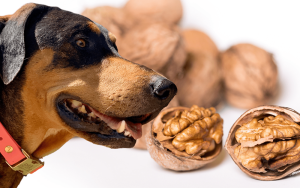Can Dogs Eat Strawberries? A Complete Guide to the Benefits, Risks, and Tips for Feeding Your Dog Strawberries

Introduction
As a dog owner, you may have wondered if it’s safe to share your favorite snacks with your furry friend. Strawberries, with their sweet flavor and rich nutritional profile, are a popular fruit among humans, but can dogs eat strawberries too? The good
news is that, yes, dogs can eat strawberries in moderation, and they can even benefit from the vitamins and antioxidants these delicious berries provide.
However, before feeding your dog strawberries, there are important considerations to ensure it’s a safe and healthy treat for your pet. This comprehensive guide will walk you through the benefits, potential risks, and best practices for incorporating
strawberries into your dog’s diet.
1. Are Strawberries Safe for Dogs?
Yes, strawberries are generally safe for dogs when offered in moderation. They are non-toxic to dogs, unlike some other fruits that can pose a risk, such as grapes and raisins. The vibrant red color and sweet taste of strawberries make them an appealing
option for treating your dog, but as with any new food, it’s essential to introduce them cautiously.
Strawberries are packed with vitamins and antioxidants that can support your dog’s overall health, but they should never replace a balanced, nutritionally complete dog food. Always remember to check with your veterinarian before introducing any new foods
into your dog’s diet.
2. Nutritional Benefits of Strawberries for Dogs
Strawberries are not only tasty but also packed with nutrients that can benefit your dog. Here’s a breakdown of the key nutritional elements found in strawberries:
- Vitamin C: Strawberries are an excellent source of vitamin C, which supports a healthy immune system, skin health, and wound healing in dogs.
- Fiber: Fiber aids in digestion and helps maintain a healthy weight by promoting a feeling of fullness. It also supports gastrointestinal health.
- Antioxidants: Strawberries are rich in antioxidants such as flavonoids, which help combat free radicals, supporting your dog’s overall health and potentially reducing inflammation.
- Low in Calories: Strawberries are low in calories, making them an excellent low-calorie treat for dogs that are overweight or prone to obesity.
- Water Content: Strawberries are made up of about 90% water, helping keep your dog hydrated, especially in the summer months.
While strawberries provide these health benefits, it’s essential to remember that they should be fed in moderation to avoid excessive calorie intake or digestive upset.
3. How to Safely Feed Strawberries to Your Dog
Before offering your dog strawberries, follow these important guidelines to ensure they are safe and enjoyable:
- Wash Thoroughly: Always wash strawberries carefully to remove any pesticides, dirt, or chemicals that could harm your dog. Organic strawberries are a great option if available.
- Remove the Stem: The green stem and leaves of a strawberry are not toxic, but they can be difficult for your dog to digest. It’s best to remove them before serving the fruit.
- Serve in Small Pieces: Depending on the size of your dog, slice the strawberry into small, bite-sized pieces. This is especially important for smaller dogs to avoid choking hazards.
- Start Slowly: Introduce strawberries gradually into your dog’s diet. Start with one or two small pieces and monitor your dog for any adverse reactions such as gastrointestinal upset, allergies, or discomfort.
- Avoid Sugar or Additives: Never serve strawberries with sugar, syrup, or other additives. These can be harmful to your dog and defeat the purpose of offering a healthy, natural treat.
4. The Potential Risks of Feeding Strawberries to Dogs
While strawberries are safe for most dogs, there are a few risks to be aware of:
- Choking Hazard: If your dog is small or tends to gulp down food quickly, there is a risk of choking. Always cut strawberries into small pieces appropriate for your dog’s size.
- Digestive Upset: Some dogs may have sensitive stomachs, and introducing new foods too quickly can cause gastrointestinal upset, including diarrhea or vomiting. Start with small portions and monitor your dog’s reaction.
- Allergic Reactions: While rare, some dogs can be allergic to strawberries. Symptoms of an allergic reaction include itching, swelling, hives, or digestive issues. If you suspect your dog is having an allergic reaction, stop feeding
strawberries and consult your vet immediately. - Sugar Content: While strawberries are low in sugar compared to many other fruits, overfeeding them can lead to weight gain, especially in less active dogs. Additionally, dogs with diabetes or those on special diets should avoid high-sugar
fruits.
5. Can Dogs Eat Frozen Strawberries?
Frozen strawberries can be a great summertime treat for your dog, especially in warmer climates. Freezing strawberries can help preserve their nutrients and offer a refreshing, cool snack for your pet. However, you must still follow the same guidelines
when feeding frozen strawberries:
- Size and Safety: Just like fresh strawberries, slice frozen strawberries into small pieces to avoid choking hazards.
- Moderation: Don’t overfeed frozen strawberries, as they can cause digestive upset in some dogs if too many are consumed in one sitting.
- No Added Ingredients: Ensure the frozen strawberries you offer don’t contain any added sugars, syrups, or preservatives, as these could be harmful to your dog.
6. Strawberry-Based Dog Treats: A Healthy Option?
If you’re looking for ways to incorporate strawberries into your dog’s diet without serving them as a standalone snack, consider making homemade strawberry-based dog treats. These treats can be a healthy, fun way to treat your dog while adding variety
to their diet.
- Strawberry Yogurt Pops: Mix pureed strawberries with plain, unsweetened yogurt (without any artificial sweeteners like xylitol, which is toxic to dogs) and freeze the mixture in an ice cube tray to make refreshing popsicles.
- Strawberry Biscuits: You can bake homemade dog biscuits using fresh or pureed strawberries as an ingredient. Look for recipes that use whole wheat flour and other dog-safe ingredients.
- Strawberry Smoothies: Blend strawberries with dog-safe ingredients like pumpkin or banana to create a refreshing smoothie. Just be sure to avoid adding any harmful additives such as sugar or xylitol.
7. How Much Strawberry Should You Feed Your Dog?
Moderation is key when feeding strawberries to your dog. As a general guideline:
- Small Dogs: Limit them to one or two small strawberry pieces per day.
- Medium Dogs: You can feed up to three to five strawberry pieces per day.
- Large Dogs: Larger dogs may enjoy more strawberries, but it’s still best to limit them to 6-8 pieces per day.
Always adjust portions based on your dog’s size, activity level, and overall health. Keep in mind that strawberries should complement a balanced diet and not replace your dog’s regular meals.
8. Conclusion: Strawberries as a Safe and Healthy Treat for Your Dog
In conclusion, strawberries are a safe, healthy, and delicious treat for most dogs when fed properly. They are packed with beneficial nutrients like vitamin C, fiber, and antioxidants, offering your dog several health benefits. However, like any treat,
they should be served in moderation and with care to avoid choking hazards, digestive issues, or allergic reactions.
If you’re unsure about how many strawberries to feed your dog or if they have specific health concerns, it’s always best to consult with your veterinarian. With proper precautions, strawberries can be a tasty and nutritious addition to your dog’s diet,
giving them a sweet surprise every now and then!
Frequently Asked Questions (FAQs)
1. Can strawberries cause diarrhea in dogs?Yes, feeding too many strawberries at once can cause digestive upset, including diarrhea, due to their fiber content. Introduce strawberries gradually and stick to small portions.
2. Are strawberries good for dogs with diabetes?While strawberries are low in sugar, they still contain natural sugars. Dogs with diabetes should have strawberries in moderation, and it’s best to consult with a veterinarian before adding
them to their diet.
3. Can I feed my dog strawberry jam or preserves?No, strawberry jam or preserves often contain added sugar and preservatives that are harmful to dogs. Stick to fresh, raw strawberries for the healthiest option.
4. How often can I give my dog strawberries?Strawberries can be given as an occasional treat. Once or twice a week is ideal, depending on your dog’s size and overall health.






